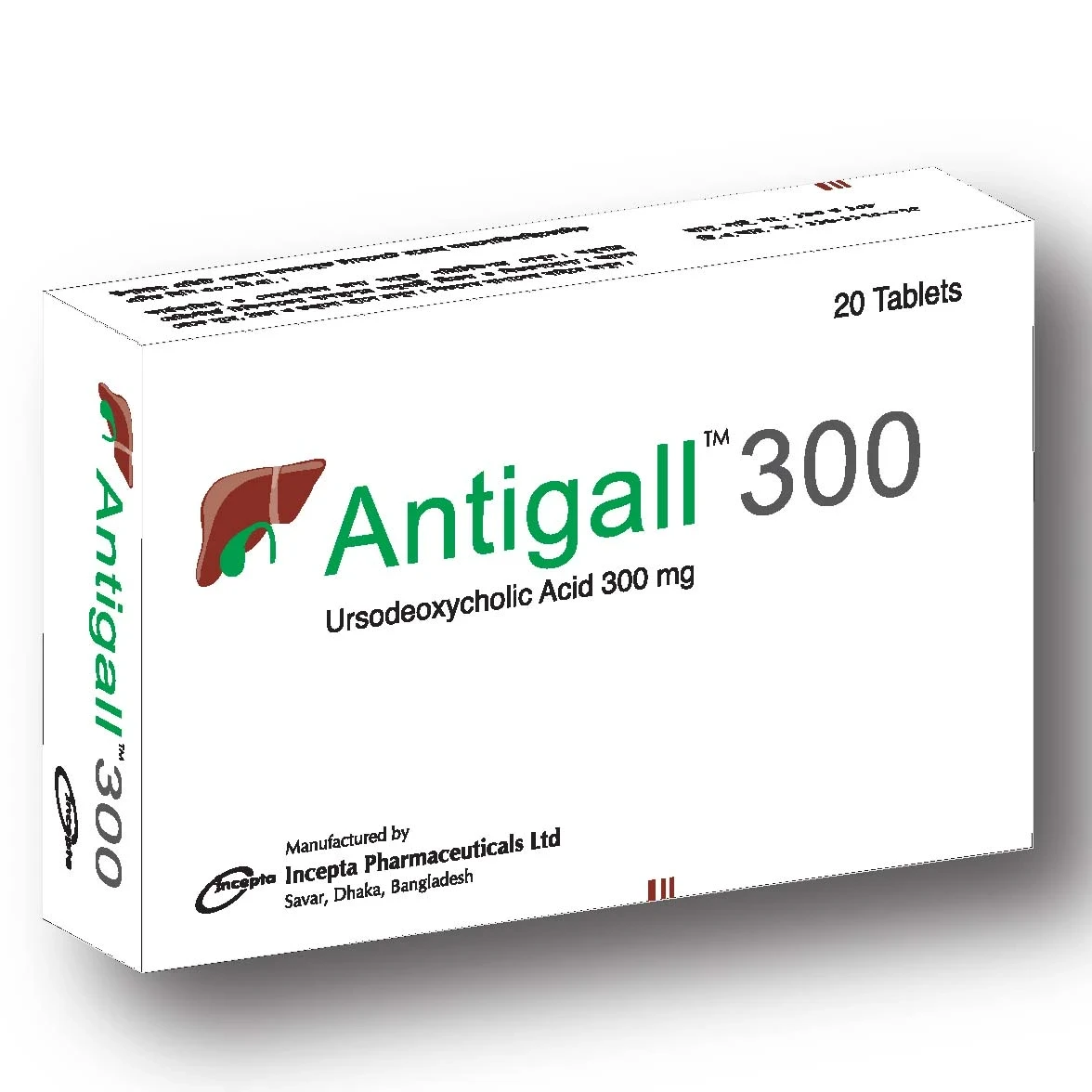Unit Price:
৳ 22.00
(2 x 10: ৳ 440.00)
Strip Price:
৳ 220.00
Also available as:
Indications
Antigall is indicated for the treatment of-
- Cholestasis (Jaundice)
- Viral Hepatitis
- Alcoholic Fatty Liver
- Primary Billiary Cirrhosis (PBC)
- Primary Sclerosing Cholangitis (PSC)
- Dissolution of Gallstones and Non-Alcoholic Steato Hepatitis (NASH).
Description
Antigall is used to reduce the cholesterol saturation of bile and to promote the dissolution of gallstones. The cholesterol saturation of bile is reduced by Antigall, allowing gradual solubilization of cholesterol gallstones. Cholesterol of secretion into bile is reduced and bile acid secretion rate is increased during Antigall treatment without a reduction in phospholipids.
Pharmacology
Ursodeoxycholic Acid is a naturally occurring bile acid used to treat different hepatobilliary disorders. The activity of Ursodeoxycholic Acid is achieved through a decrease in secretion of cholesterol in bile. Ursodeoxycholic Acid achieves this through a few mechanisms: it reduces cholesterol absorption, suppresses liver cholesterol synthesis and it does not inhibit bile acid synthesis.
Therefore, alters bile composition from supersaturated to unsaturated. Ursodeoxycholic Acid also promotes the formation of liquid cholesterol crystal complexes which enhance removal of the cholesterol from the gallbladder into the intestine to be expelled. Ursodeoxycholic Acid improves cholestatic liver diseases by-
Therefore, alters bile composition from supersaturated to unsaturated. Ursodeoxycholic Acid also promotes the formation of liquid cholesterol crystal complexes which enhance removal of the cholesterol from the gallbladder into the intestine to be expelled. Ursodeoxycholic Acid improves cholestatic liver diseases by-
- Protecting cholangiocytes against cytotoxicity of hydrophobic bile acids
- Stimulating hepatobilliary secretion
- Protecting hepatocytes against bile acid-induced apoptosis
Dosage & Administration
Dissolution of Gall stones: 8-12 mg/kg/day either as single night time dose or in divided doses.
Primary Billiary Cirrhosis: 10-15 mg/kg/day in 2-4 divided doses.
Acute Viral Hepatitis: 600 mg/day.
Alcoholic Fatty Liver: 300 mg/day.
Primary Sclerosing Cholangitis: 25-30 mg/kg/day.
Dissolution of Gallstones and Non-Alcoholic Steato Hepatitis: 13-15 mg/kg/day.
Primary Billiary Cirrhosis: 10-15 mg/kg/day in 2-4 divided doses.
Acute Viral Hepatitis: 600 mg/day.
Alcoholic Fatty Liver: 300 mg/day.
Primary Sclerosing Cholangitis: 25-30 mg/kg/day.
Dissolution of Gallstones and Non-Alcoholic Steato Hepatitis: 13-15 mg/kg/day.
Interaction
Antigall should not be used with drugs, such as oestrogenic hormones, that increase bile cholesterol. Concomitant administration with bile-acid binding drugs including antacids, charcoal and cholestyramine should be avoided, since this may reduce the effectiveness of therapy with Antigall.
Contraindications
Non-functioning gall-bladder calcified and pigmented gallstones, inflammatory bowel disease.
Side Effects
Commonly reported side effects are nausea, vomiting, diarrhoea, gallstone opacilication, pruritus.
Pregnancy & Lactation
Pregnancy category B. No evidence of harm has been reported in pregnancy. It has been effectively used for the treatment of cholestasis of pregnancy during the last trimester without any side effects. Problems have not been documented in humans regarding breast feeding.
Precautions & Warnings
It should be used cautiously in those with liver disease.
Therapeutic Class
Anti-gallstones drugs: Bile Acids
Storage Conditions
Store below 25° C. Protected from light and moisture. Keep the medicine out of the reach of children.


